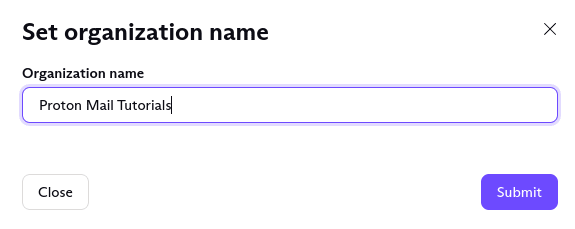This post was updated on June 22, 2022
Despite the rise in online communication technologies such as instant messaging and video calls, email is still the preferred and often most efficient means for conducting business today. Having a professional email address for your business creates the impression that you are a credible and trustworthy company and is key to building trust and confidence in your customers.
In this article, we’ll discuss what a professional email address is, the reasons you should use a professional email for your business, and how to set up Proton’s secure business email(new window) for success.
What is a professional email address?
If you run an online business, chances are you’ll reach out to potential or existing clients through email. Since email is often the first touchpoint for your customers, creating a professional email address used solely for business communications is crucial.
After analyzing more than 12 million email addresses, Hunter.io(new window) found the common formats for business email addresses:

For example, if your name is John Smith and you own Smith Marketing, your professional email address could be john@smithmarketing.com.
Why you should use a professional email address for your business
Your professional email address reflects your brand and tells potential customers how seriously they should take your business. Here are some reasons you should use a professional email address to build your brand and maintain customer relationships.
Creating a professional image
Setting up a professional email address for your business is one of the best ways to appear credible online. Since your email address is likely the first thing your customers think of when they want to contact your business, it forms a vital part of your brand identity. Using a business email address like john@smithmarketing.com strikes a more professional tone than using a business email without a website (like johnsmith8475@hotmail.com), legitimizing your business.
Keeping a consistent brand identity
A professional email address that fits your brand can increase sales and customer satisfaction. As your company grows, you can give your employees their own professional email addresses associated with your domain name, such as mary.jones@smithmarketing.com or alex.johnson@smithmarketing.com. This helps customers recognize and remember your brand, reinforcing the idea that your company is well-established and trustworthy.
Avoiding spam filters
Email providers often use domain names to distinguish between legitimate and spam emails. Since anyone can create a free email account, emails from free email providers are more likely to be marked as spam. On the contrary, using a professional email address connected to your domain name is a sign of credibility, reducing the likelihood of spam filters flagging your business emails as junk.
Organizing emails by department or purpose
With a custom domain name, you can set up specific email addresses to channel emails to the right departments. Professional email addresses such as sales@smithmarketing.com or support@smithmarketing.com not only organize email workflows for your employees but also ensure that your customers receive responses from a consistent, trustworthy email address when they contact your business.
Why Proton is the best email provider for your business
Choosing the right email provider is critical to the success of your company. Since business emails can contain sensitive information about your customers and your company, keeping them safe and private should be a top priority.
At Proton, we created the world’s largest encrypted email service which protects your customers’ confidentiality with state-of-the-art encryption and security features. We believe everyone should be able to choose how their data gets shared and with whom.
Privacy
When you use Proton Mail(new window), all emails exchanged within your company are automatically end-to-end encrypted(new window), meaning only the sender and recipient can read the contents of the messages. All email attachments you send from your Proton Mail inbox are also automatically encrypted(new window) and stored using zero-access encryption(new window) on our servers.
If your recipient does not use Proton Mail, you can use our Password-protected Emails(new window) feature to communicate securely with them. To read the message, your recipient must enter a previously agreed-upon password. Password-protected Emails also support end-to-end encryption of attachments, so all your files are private and only accessible to your recipient.
Security
Since launching Proton Mail in 2014, we’ve only used secure implementations of encryption algorithms such as AES(new window) and RSA. AES, in particular, has been chosen by the National Institute of Standards and Technology as the cipher of choice when securing data transmission within the US government.
Additionally, all Proton Mail apps are fully open source and have been independently audited(new window) by top security firms. We are staunch advocates for open-source(new window) software, and we maintain two popular open-source encryption libraries, OpenPGP.js(new window) and GopenPGP(new window).
Features
Proton Mail offers plenty of powerful features for your business while being intuitive and easy to use.
All our business plans include end-to-end encrypted Proton Mail(new window), Proton Calendar(new window), Proton Drive(new window), and Proton VPN(new window) in a single per-user subscription.
Proton Mail Essentials is our simplest plan offering you secure email with 15 GB of total storage and 10 addresses per user, support for three custom email domains, and basic VPN access on one device per user.
Proton Business gives you secure email with 500 GB of total storage and 15 email addresses per user, support for 10 custom email domains, and the highest speed VPN on 10 devices per user with more servers worldwide and extra security features.
| Proton Mail Essentials | Proton Business |
|---|---|
| • 15 GB storage per user • 10 email addresses per user • Unlimited folders, labels, and filters • Support for 3 custom domains • Contacts groups management • Proton Calendar • Proton Drive (beta) • Proton VPN (connect on 1 device per user) | • 500 GB storage per user • 15 email addresses per user • Unlimited folders, labels, and filters • Support for 10 custom domains • Contacts groups management • Proton Calendar • Proton Drive (beta) • Proton VPN (connect on 10 devices per user) |
If you have more than 100 people on your team, you can also upgrade to our Enterprise plan, which unlocks:
- Additional storage
- Additional addresses
- Dedicated support
- Onsite installations
- White-labeled themes and custom integration
Learn more about Proton for Business plans(new window)
Last but not least, you can access Proton Mail on any web browser or work on the go with our iOS(new window) and Android(new window) mobile apps.
How to set up Proton Mail for your business
Setting up Proton Mail for your business is easy:
1. Sign up for a Proton for Business plan
To start using Proton Mail for your business, you need a custom domain (like yourbusinessname.com) and a Proton for Business plan.
If you don’t have a custom domain, you can purchase one from domain name registrars such as GoDaddy(new window), Namecheap(new window), and Domain.com(new window).
Sign up for a Proton for Business plan(new window)
2. Set up your domain
To set up your domain, log in to your Proton Account and click Settings → Go to settings.
Select Domain Names in the left sidebar. Under Domain names, click Add domain and use the setup wizard to complete your domain configuration.

Learn more about how to use a custom domain with Proton Mail(new window)
3. Create your organization
Next, you need to create your organization:
Select Settings → Go to settings → Multi-user support and click Enable multi-user support.
Give your organization a name and choose your organization’s encryption key strength. This key will be used to encrypt emails sent within your team.

Then set a password for your organization, which prevents Proton from accessing your key.
Last but not least, you can allocate storage space to your administrator account, allowing you to store emails, attachments, and files.
Learn more about how to create an organization(new window)
4. Set up new user accounts
Adding new user accounts will give your employees their own Proton Accounts:
Click on Settings → Go to settings → Users and Addresses and select Add user.

Enter a name, email address, and password to create a new user account. You can also allocate storage to this account.
Learn more about how to set up new user accounts(new window)
5. Migrate your existing emails
If you have existing emails with an external service provider, you can transfer your emails, calendars, and contacts using Easy Switch(new window):
Click on Settings → Go to settings → Import via Easy Switch and select a service provider to get started.

Easy Switch works in the background, automatically encrypting your emails and other data as they arrive in your Proton Account.
Learn more about migrating to Proton using Easy Switch(new window)
It’s as easy as that. Whether you’re a small or large enterprise, you can use Proton Mail to secure your business communications and stay professional.











